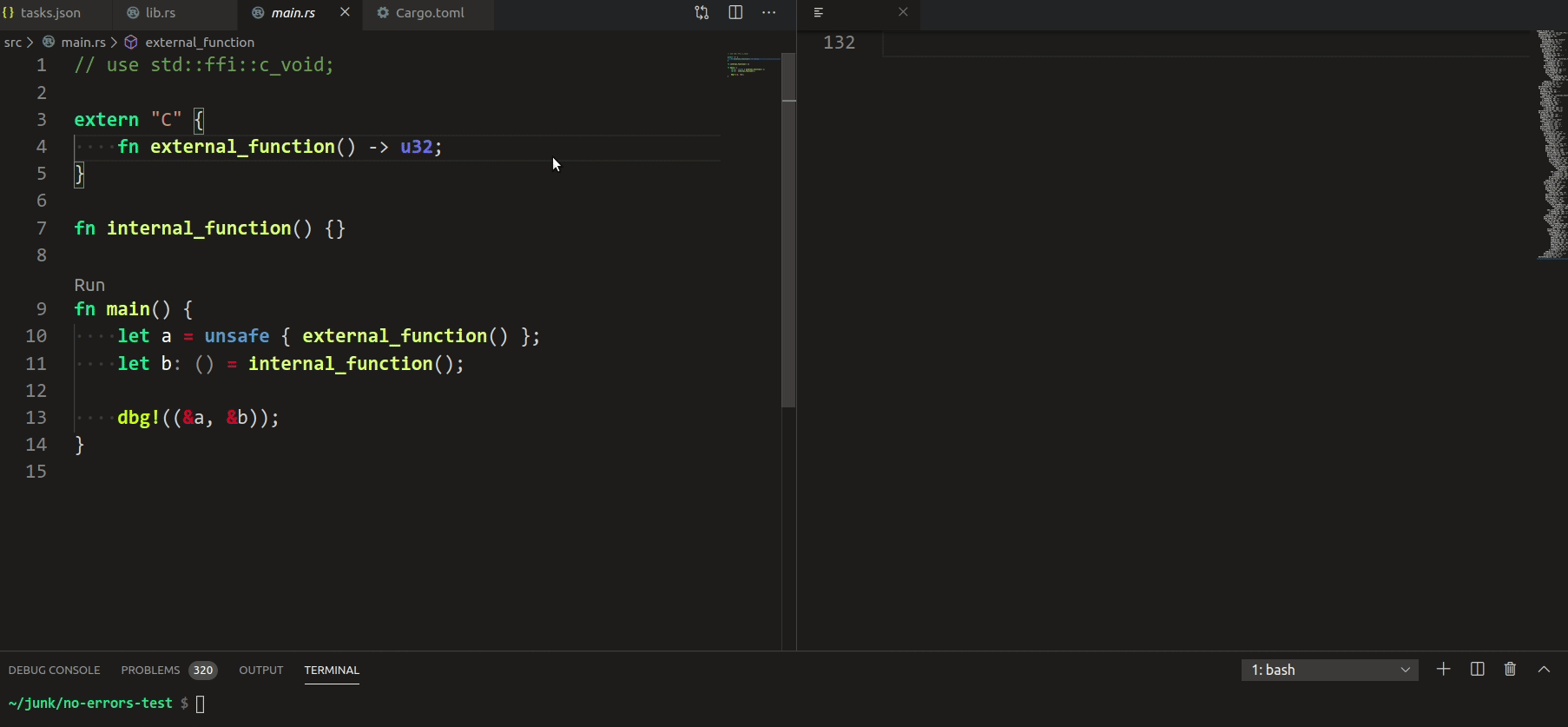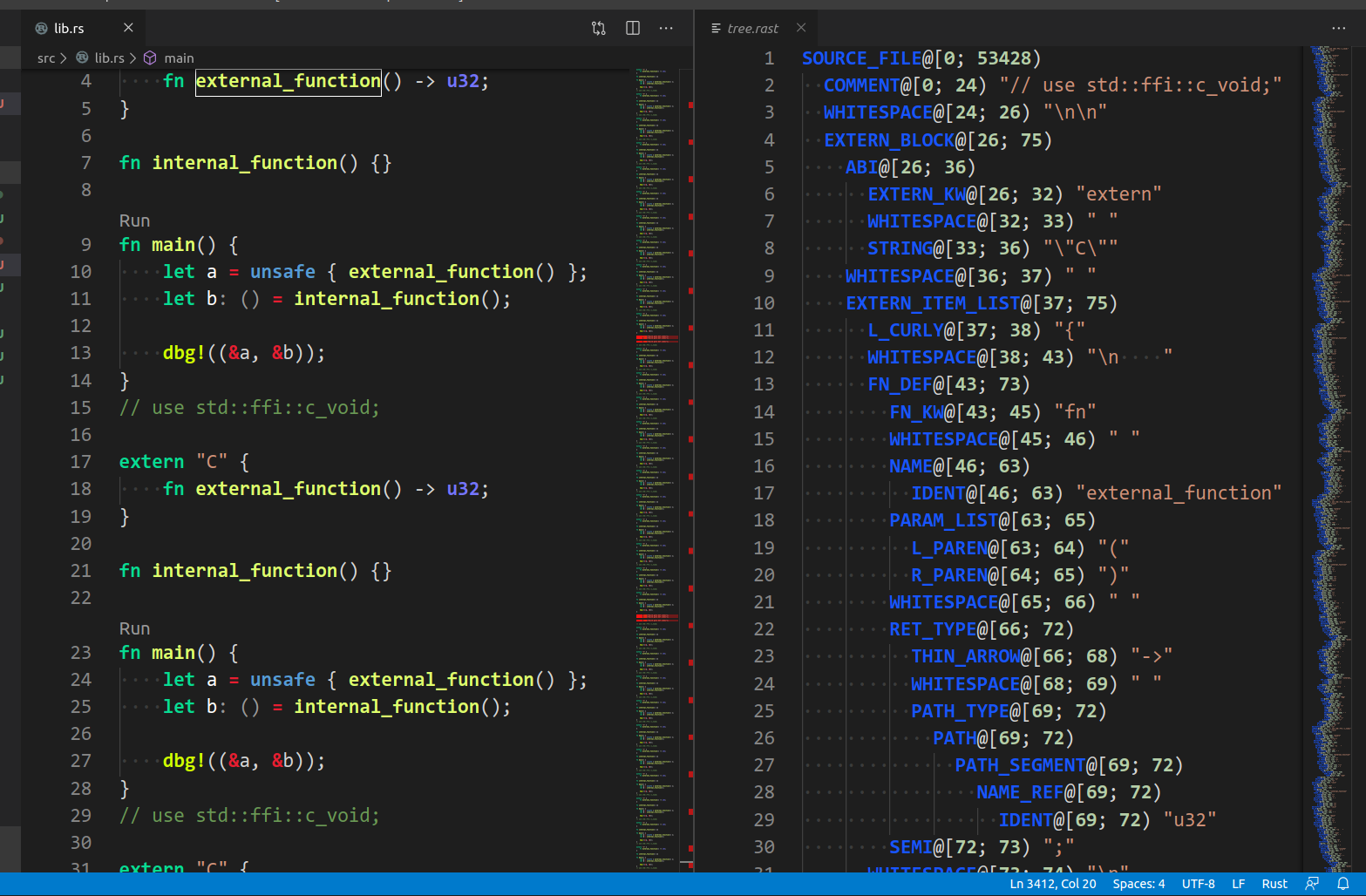We treat macro calls as expressions (there's appropriate Into impl),
which causes problem if there's expresison and non-expression macro in
the same node (like in the match arm).
We fix this problem by nesting macor patterns into another node (the
same way we nest path into PathExpr or PathPat). Ideally, we probably
should add a similar nesting for macro expressions, but that needs
some careful thinking about macros in blocks: `{ am_i_expression!() }`.
3800: Introduce ra_proc_macro_srv r=matklad a=edwin0cheng
This PR add preliminary for server side of proc macro :
1. Add crate setup
2. IO for server side
Co-authored-by: Edwin Cheng <edwin0cheng@gmail.com>
3746: Add create_function assist r=flodiebold a=TimoFreiberg
The function part of #3639, creating methods will come later
- [X] Function arguments
- [X] Function call arguments
- [x] Method call arguments
- [x] Literal arguments
- [x] Variable reference arguments
- [X] Migrate to `ast::make` API
Done, but there are some ugly spots.
Issues to handle in another PR:
- function reference arguments: Their type isn't printed properly right now.
The "insert explicit type" assist has the same issue and this is probably a relatively rare usecase.
- generating proper names for all kinds of argument expressions (if, loop, ...?)
Without this, it's totally possible for the assist to generate invalid argument names.
I think the assist it's already helpful enough to be shipped as it is, at least for me the main usecase involves passing in named references.
Besides, the Rust tooling ecosystem is immature enough that some janky behaviour in a new assist probably won't scare anyone off.
- select the generated placeholder body so it's a bit easier to overwrite it
- create method (`self.foo<|>(..)` or `some_foo.foo<|>(..)`) instead of create_function.
The main difference would be finding (or creating) the impl block and inserting the `self` argument correctly
- more specific default arg names for literals.
So far, every generated argument whose name can't be taken from the call site is called `arg` (with a number suffix if necessary).
- creating functions in another module of the same crate.
E.g. when typing `some_mod::foo<|>(...)` when in `lib.rs`, I'd want to have `foo` generated in `some_mod.rs` and jump there.
Issues: the mod could exist in `some_mod.rs`, in `lib.rs` as `mod some_mod`, or inside another mod but be imported via `use other_mod::some_mod`.
- refer to arguments of the generated function with a qualified path if the types aren't imported yet
(alternative: run autoimport. i think starting with a qualified path is cleaner and there's already an assist to replace a qualified path with an import and an unqualified path)
- add type arguments of the arguments to the generated function
- Autocomplete functions with information from unresolved calls (see https://github.com/rust-analyzer/rust-analyzer/pull/3746#issuecomment-605281323)
Issues: see https://github.com/rust-analyzer/rust-analyzer/pull/3746#issuecomment-605282542. The unresolved call could be anywhere. But just offering this autocompletion for unresolved calls in the same module would already be cool.
Co-authored-by: Timo Freiberg <timo.freiberg@gmail.com>
3814: Add impl From for enum variant assist r=flodiebold a=mattyhall
Basically adds a From impl for tuple enum variants with one field. It was recommended to me on the zulip to maybe try using the trait solver, but I had trouble with that as, although it could resolve the trait impl, it couldn't resolve the variable unambiguously in real use. I'm also unsure of how it would work if there were already multiple From impls to resolve - I can't see a way we could get more than one solution to my query.
Fixes#3766
Co-authored-by: Matthew Hall <matthew@quickbeam.me.uk>
3816: vscode: add goto ast node definition from rust source code r=Veetaha a=Veetaha
By holding the `Ctrl` key you can now goto-definition of the appropriate syntax token in the syntax tree read-only editor. But actually going to the definition is not very convenient, since it opens the new editor, you'd rather just hold the `Ctrl` and look at the syntax tree because it is automatically scrolled to the proper node and the node itself is enclosed with text selection.
Unfortunately, the algorithm is very simple (because we don't do any elaborate parsing of the syntax tree text received from the server), but it is enough to debug not very large source files.
I tested the performance and in a bad case (rust source file with 5K lines of code) it takes `1.3` seconds to build the `rust -> ast` mapping index (lazily once on the first goto definition request) and each lookup in this worst-case is approx `20-120` ms. I think this is good enough. In the simple case where the file is < 100 lines of code, it is instant.
One peculiarity that I've noticed is that vscode doesn't trigger the goto-definition provider when the user triggers it on some punctuation characters (i.e. it doesn't underline them and invoke te goto-definition provider), but if you explicitly click `Ctrl+LMB` it will only then invoke the provider and navigate to the definition in a new editor. I think this is fine ;D

Related: #3682
Co-authored-by: veetaha <veetaha2@gmail.com>
3819: Unique package by name and version. r=matklad a=o0Ignition0o
This commit is a fixup of #3781 I introduced a bug by using a PackageId to refer to a crate when its name conflicts with a dependency.
It turns out the package id currently is `name version path` while cargo expects `name:version` as argument eg:
Cargo command with a `PackageId`:
```
> Executing task: cargo test --package 'config 0.1.0 (path+file:///Users/ignition/Projects/oss/config)' --test default -- test_with_name --exact --nocapture <
```
Cargo command with `name:version`:
```
> Executing task: cargo test --package 'config:0.1.0' --test default -- test_with_name --exact --nocapture <
```
Co-authored-by: o0Ignition0o <jeremy.lempereur@gmail.com>
3817: vscode: highlight syntax tree ro editor r=matklad a=Veetaha
Small textmate grammar declaration to make rust-analyzer syntax tree more easily inspectable:
Btw, if we change the file extension of our `ra_syntax/test_data/**` files to `.rast` they should be highlighted in vscode too.
The colors of the tokens are actually going to be color-theme dependent, or you can customize them via:
```jsonc
{
"editor.tokenColorCustomizations": {
"textMateRules": [ { "scope": "name", "settings": { /* */ } } ]
}
}
```

Related: #3682
Co-authored-by: veetaha <veetaha2@gmail.com>
This commit is a fixup of a bug I introduced by using a PackageId to refer to a crate when its name conflicts with a dependency.
It turns out the package id currently is `name version path` while cargo expects `name:version` as argument.